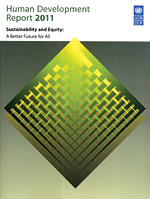 Human Development Report 2011 Sustainability and Equity: A Better Future for All UNDP, Palgrave Macmillan, 2011 |
UNDP's annual Human Development Reports are much anticipated for their thematic stress. Last year's report almost prophetically looked at democracy deficit, and seemed to predict the Arab Spring. Earlier reports have looked at the linkages of population migration on the economies of labour-exporting countries, as well as the political and social impact of large numbers of able-bodied young people working abroad.
The 2011 report tries to connect the dots between sustainable development, environmental degradation and equity. Climate change and a worsening ecological crisis are seen to accentuate existing inequities in society, and an increase in poverty in turn affects the environment.
The report, therefore, goes to the heart of the matter: why and how to give the poor more choices so that they have more say in the sustainable use of natural resources. The experts conclude that unless sustainable development and equity go hand-in-hand the quality of life of the world's poor is not going to get better and the global environment will suffer.
Some have criticised UNDP's annual reports as academic navel-gazing where an enormous amount of money is spent to state the obvious. In a way this is true: who would argue that societies don't have to be more equal? Or that the poor need to be given choices so they don't unsustainably cut down forests or overfish?
What this year's report does is widen the scope of the environment not just to the global and national, but at the individual level as well. It includes people in the future who will suffer from environmental degradation carried out today. The poorest of the poor and the marginalised will continue to bear the consequences of environmental deterioration, be it from erratic rains caused by climate change to smokey home fires that kill children from lung infection.
'The most disadvantaged people carry a double burden of deprivation,' the report says. 'More vulnerable to the wider effects of environmental degradation, they must also cope with threats to their immediate environment posed by indoor air pollution, dirty water and unimproved sanitation.'
The report cites Costa Rica's enlightened policies in 1955 to safeguard equity and the environment as being exemplary for a developing nation. The country was way ahead of its time, and in the 1990s became the first country to enshrine environmental rights in the constitution and a pioneer in selling carbon credits.
The tables at the back of the book on Nepal's poor ranking is shocking, and should be required reading for our PhD prime minister. Nepal is 157th in the Human Development Index (one down from last year not because we didn't do well, but because others did better). The inequality-adjusted HDI is even worse, pointing to a big income gap between rich and poor.
Equality doesn't bring equity. Improving the people's capability and providing equal opportunities for all boats to rise together with the tide is more important. The report helps us better understand glaring global inequities, inequities within countries, and an unfair inter-generational burden on people who come after us.
Kunda Dixit
Read also:
"Encouraging progress"


